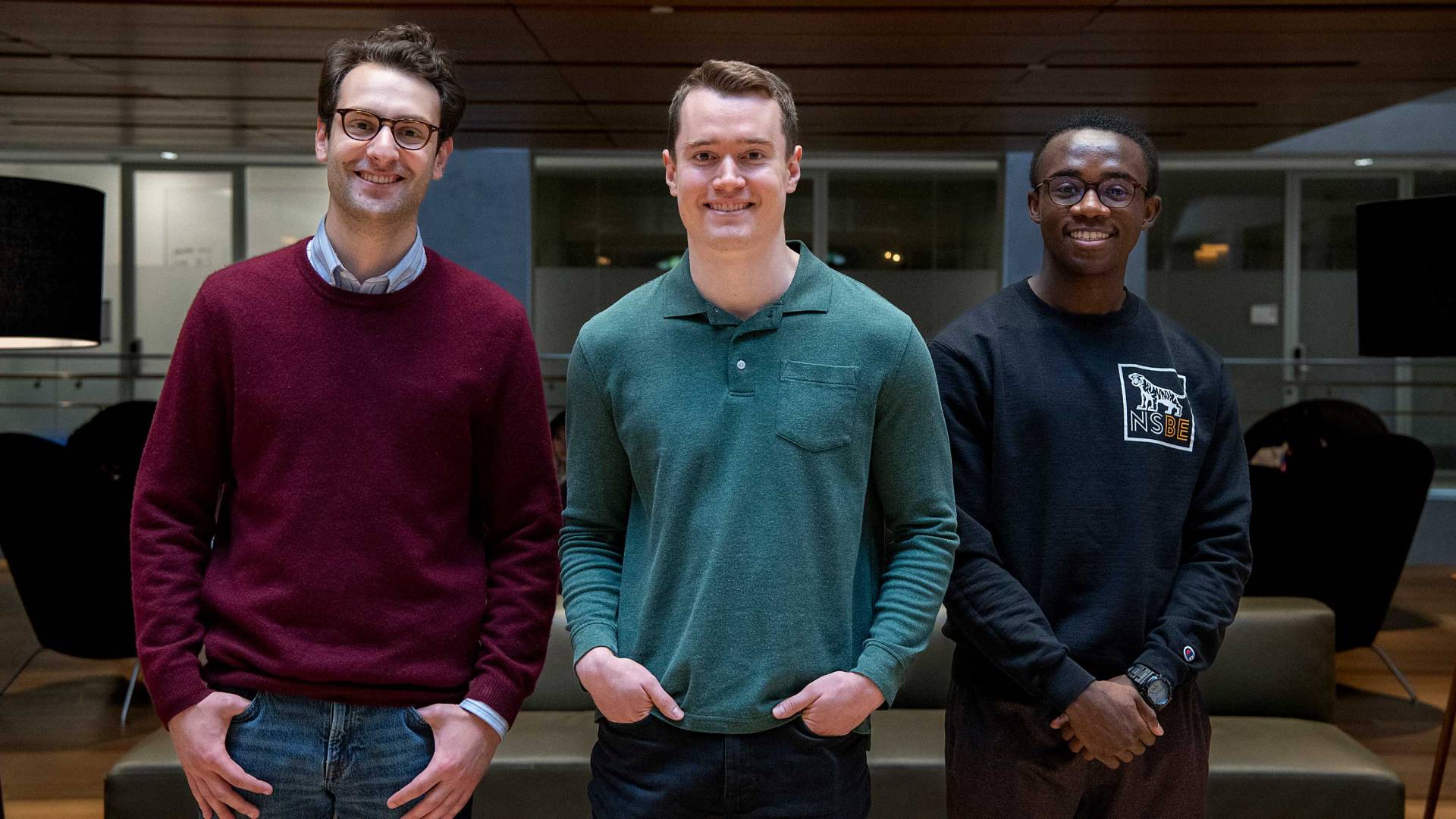Princeton University seniors David Amelemah, Zachariah Sippy and Jack Thompson have been awarded the Henry Richardson Labouisse 1926 Prize to pursue international civic engagement projects for one year following graduation.

Princeton University seniors (left to right) Zachariah Sippy, Jack Thompson and David Amelemah have been awarded the Henry Richardson Labouisse 1926 Prize to pursue international civic engagement projects for one year following graduation.
Amelemah, a chemical and biological engineering major from Amityville, New York, will aim to understand a messenger RNA processing method called post-loading at the University of Sydney. Sippy, a history major from Lexington, Kentucky, will research and report on constitutional and political developments in the Southern Cone, especially the ongoing Chilean constitutional reform process, from Santiago. Thompson, a Spanish and Portuguese major with a focus in international studies, from Sand Springs, Oklahoma, will travel to São Paulo to work at the intersection of public policy and healthcare in Brazil.
The Labouisse Prize, which awards $35,000 to each recipient, enables graduating seniors to engage in a project that exemplifies the life and work of Henry Richardson Labouisse, a 1926 Princeton alumnus who was a diplomat, international public servant and champion for the causes of international justice and international development. Labouisse’s daughter Anne Peretz and family established the prize in 1984. It is administered by the Princeton Institute for International and Regional Studies (PIIRS).
“Princeton alumnus Henry M. Labouisse was a leader of the great global generation that defeated fascism and ended colonialism,” said Emmanuel Kreike, professor of history and chair of the Labouisse selection committee. “Today, ultra-nationalist and racist populism call for a resurrection of old constraints on transnational and international mobility and the need for future leaders to live, work and research in the service of humanity is perhaps more urgent than ever before.”
David Amelemah
Amelemah will spend his fellowship year in the lab of Greg Warr, professor of chemistry at the University of Sydney, in an attempt to understand a messenger RNA processing method called post-loading through two advanced laboratory techniques: small angle x-ray scattering and small angle neutron scattering. “Post-loading can reduce vaccine costs, increase accessibility to underdeveloped economies, and enable flexibility in the vaccine-creating process by eliminating the cold chain requirement,” Amelemah said.
As an undergraduate, Amelemah worked under Robert K. Prud'homme, professor of chemical and biological engineering, pioneering a novel technique to load lipid nanoparticles with mRNA in a process that would eliminate the need for cold-chain handling of current mRNA COVID vaccines. Amelemah’s research provided the basic data for his Labouisse proposal. “This collaboration will break new ground in understanding the internal structure of mRNA lipid nanoparticles and changes occurring between unloaded and loaded samples,” Prud'homme said. “The end result will be a fundamental understanding that will enable use of mRNA lipid nanoparticles for global health.”
Medical research has been a long-standing interest of Amelemah’s, and he hopes to pursue a Ph.D. in biological engineering. “I want to join the pharmaceutical industry or become an academic who collaborates with industry like my senior thesis adviser [Prud’homme],” he said. “I have wondered why I am drawn to research even though it does not seem lucrative. Time and time again, I realize that it is because I want my impact to travel farther than I ever could.”
Amelemah is also a triple jumper on the men’s varsity track and field team and a senator for Princeton’s chapter of the National Society of Black Engineers.
Zachariah Sippy
Sippy intends to study the failure of the 2022 proposed constitution in Chile, and the ongoing reform process sparked by a wave of mass protests in 2019. “There’s a lot to be researched and written on that topic,” said Kim Lane Scheppele, the Laurance S. Rockefeller Professor of Sociology and International Affairs in the Princeton School of Public and International Affairs and the University Center for Human Values. “He is ready to test every taken-for-granted assumption to see whether it is warranted without getting bogged down in the process — and all with a gratifying commitment to the life of the mind and to social justice.”
Over the course of his fellowship year, Sippy plans to interview business leaders, domestic and foreign, as well as Chilean activists and politicians, to better understand how constitutional reform is subject to international economic pressures and demands. “Examining questions like these not only contributes to our understanding of contemporary Chilean politics, but also the relationship between imperialism, law and development more generally,” he said. Sippy aims to publish his research in journalistic outlets in the coming year.
He draws upon significant journalistic experience: Sippy served as managing editor at The Daily Princetonian, interned at the Forward and Washington Monthly and, as a freelancer, has been published in The Nation, Teen Vogue, Business Insider and The Hill. After his fellowship, he hopes to pursue a Ph.D. in history. “Historians and journalists practice a similar craft: asking questions, interrogating sources and archives, holding powerful figures and institutions to account, and informing public discourse through the pursuit of knowledge,” he said.
Jack Thompson
Thompson will return to Brazil, where he has spent a significant portion of time as an undergraduate. He studied abroad at the University of São Paulo. He conducted research in northern Brazil on Operação Acolhida and Brazil's response to the Venezuelan migrant crisis for his senior thesis. He interned with a research group affiliated with the Universidade Federal Fluminense as part of Princeton's International Internship Program. And he participated in a PIIRS Global Seminar in Rio de Janeiro. “Throughout my academic career, Brazil and Brazil-related issues have formed the foundation of my coursework and research, especially disadvantaged groups within Brazil like migrants and those living in Rio de Janeiro's peripheries,” he said.
At the Instituto de Estudos para Políticas de Saúde [(IEPS), Institute for Health Policy Studies], a non-profit organization, Thompson will be involved in rigorous and innovative health economics and health policy research. He will help craft participatory health policies at primary health care units in Brazil; work with IEPS's Laboratório de Políticas de Saúde to assist Brazilian municipalities in the design, implementation and monitoring of health policy pilots; design prototypes for patient involvement in clinical practice guidelines; and help promote an overall culture of health in the country. “I intend to make [this] a lifelong pursuit: creating a more just world with less poverty, less inequality and less despair,” Thompson said.
“His passion for comparative studies will be most welcome there,” said Pedro Meira Monteiro, the Arthur W. Marks ’19 Professor of Spanish and Portuguese and chair of the Department of Spanish and Portuguese. Monteiro also served as Thompson’s senior thesis adviser. “Jack will be in Brazil during a most fertile time of rebuilding of — and discussion about — the nature of the state, amidst fierce public debates on policies and the future of democracy in Brazil and beyond.”
Thompson is also pursuing certificates in history and the practice of diplomacy and Latin American studies.




